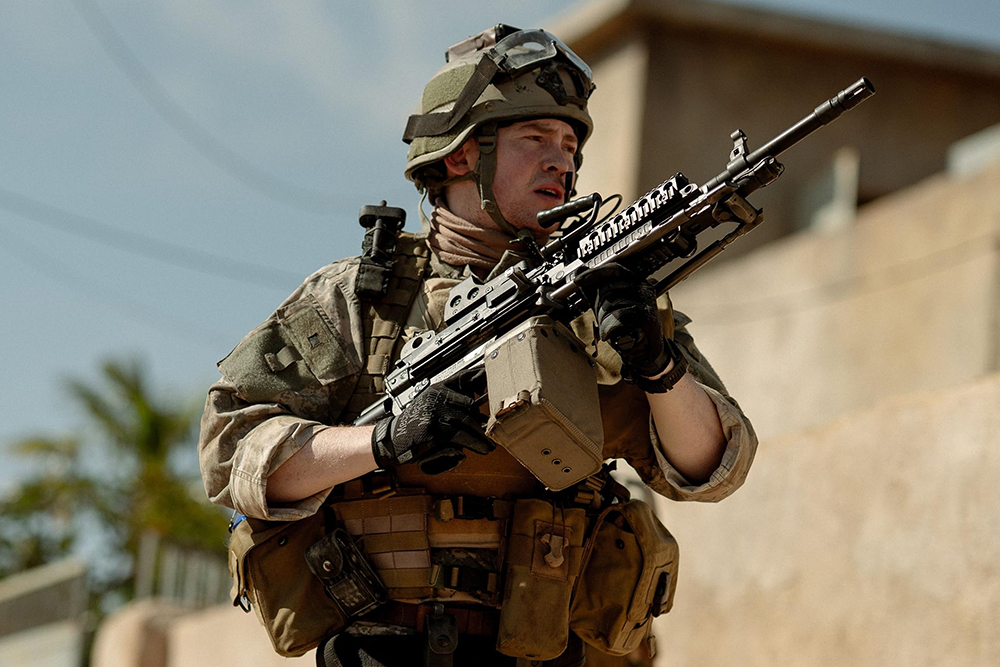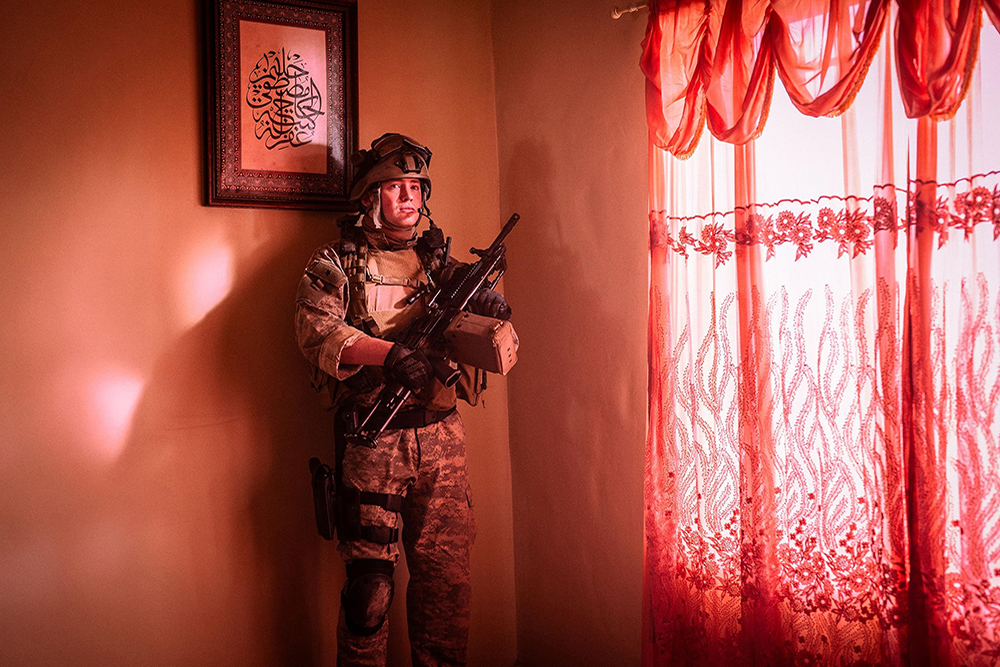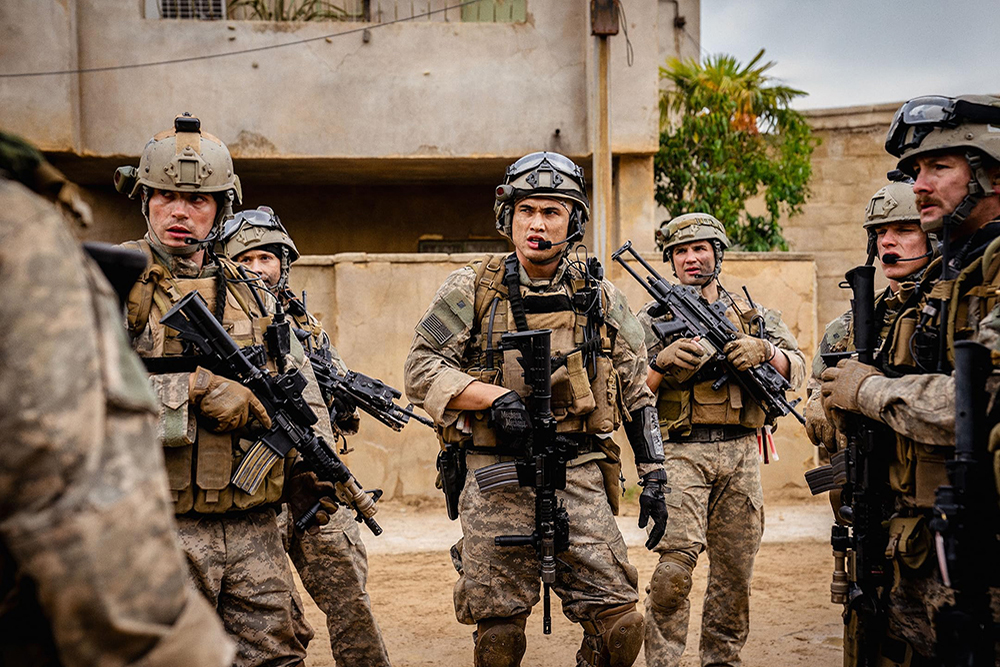VOD - Warfare: Ray Mendoza and Alex Garland Deliver a Devastatingly Real Portrait of Combat, Now Available to Watch at Home
By Mulder, 06 may 2025

With Warfare now available for home viewing and heading to Blu-ray and UHD this summer, viewers can finally experience one of the most viscerally authentic war films in years—a cinematic gut-punch delivered with surgical precision by co-directors Ray Mendoza and Alex Garland. This isn’t just another war movie built around broad heroics or CGI pyrotechnics; it’s a painstaking recreation of a single moment in time, told in real time, based on the vivid, searing memories of the soldiers who lived through it. For Mendoza, a former Navy SEAL who served during the Iraq War, Warfare is more than personal—it’s an attempt to preserve a piece of truth. It’s also a tribute, particularly to Elliott Miller, portrayed with heartbreaking sincerity by Cosmo Jarvis, who lost both his leg and his ability to speak during the incident the film is based on. His story isn’t simply acknowledged—it anchors the emotional core of a film that feels almost too raw to be fiction.
The origins of Warfare are rooted in the unique creative partnership between Garland, known for cerebral thrillers like Ex Machina and Civil War, and Mendoza, who served as the military advisor on Civil War. Garland, in what might be his final directorial work, gracefully ceded the spotlight to Mendoza for this project, stepping back to focus on writing while allowing Mendoza to channel his lived experience into the film’s soul. That decision pays off in powerful ways. The film’s style is defined by a harrowing commitment to realism: a 95-minute runtime that mirrors the actual length of the encounter in Ramadi, Iraq on November 19, 2006, during the chaotic aftermath of the Battle of Ramadi. Mendoza doesn’t dramatize or embellish—he reconstructs. The camera, in the hands of cinematographer David J. Thompson, remains grounded, almost anxious, like an invisible observer sharing the suffocating air with a platoon trying to survive moment to moment inside an Iraqi family's home. There’s no bombastic score to sweep you along—just ambient tension and the ambient sound of waiting, watching, and reacting.

The casting process reflects a reverence for the subject matter. D'Pharaoh Woon-A-Tai, known for his work on Reservation Dogs, gives a quietly powerful performance as Mendoza. There’s an eerie meta-textual quality to seeing Mendoza’s own story reflected back at him by a younger actor—one who reportedly worked closely with Mendoza during the shoot to internalize the physical and psychological toll of combat. Will Poulter brings understated gravity, while Charles Melton and Joseph Quinn deliver some of their best work to date. Cosmo Jarvis, though, leaves the deepest mark, not just because of the emotional stakes of his role but because of the physical transformation he undergoes. His portrayal of Elliott Miller is unflinching, filled with the type of quiet horror that lingers long after the credits roll. The performances never tip into sentimentality—they stay locked into the claustrophobic reality of a house turned battlefield, a moment turned into a crucible.
At its Chicago premiere at the historic Music Box Theatre, audiences sat in stunned silence as the final shot faded to black. During the post-screening Q&A, Mendoza admitted to crying multiple times during production—not out of trauma, he clarified, but out of gratitude that his brothers’ stories were being honored with such care. Garland, meanwhile, spoke of the responsibility of dramatizing history without distorting it, calling the film a “vessel of memory, not interpretation.” This approach resonated with critics and audiences alike. Released by A24 in the U.S. on April 11, 2025, the film opened to $8.3 million—an impressive figure for such a deliberately uncommercial, emotionally challenging movie. By early May, Warfare had grossed $29 million worldwide, holding strong against larger, flashier releases like The Amateur and The King of Kings.

The film’s real-time structure is perhaps its boldest formal decision. It eliminates the comfort of cinematic structure and throws the viewer directly into the thick of it. There are no time jumps, no expository flashbacks, just a suffocating 95 minutes of escalating dread. The result is a story that feels more lived than told. Mendoza once described the actual mission in Ramadi as “one of those days where time stops making sense.” By anchoring the film in that suspended reality, Warfare becomes something rare: a war film that doesn't seek to explain or glorify combat, but instead to replicate the incomprehensible speed and weight of it.
Beyond its technical achievements and narrative fidelity, Warfare succeeds because it’s unshakably human. It is a film carved from memory and stitched with loss, endurance, and brotherhood. Its release on digital platforms gives audiences everywhere a chance to experience a piece of cinema that challenges, educates, and ultimately pays tribute—not only to Mendoza’s platoon, but to the countless untold stories of modern warfare. As it heads to physical release this summer, with Blu-ray and UHD versions promised to include behind-the-scenes footage and interviews, Warfare is poised to become a staple in serious discussions about war cinema. It deserves to be, not just for what it depicts, but for how it was made—with reverence, authenticity, and the unblinking clarity of someone who was there.

Synopsis :
A platoon of Navy SEALs embark on a dangerous mission in Ramadi, Iraq, with the chaos and brotherhood of war retold through their memories of the event.
Warfare
Written and directed by Ray Mendoza, Alex Garland
Produced by Andrew Macdonald, Allon Reich, Matthew Penry-Davey, Peter Rice
Starring D'Pharaoh Woon-A-Tai, Will Poulter, Cosmo Jarvis, Kit Connor, Finn Bennett, Joseph Quinn, Charles Melton, Noah Centineo, Michael Gandolfini
Cinematography : David J. Thompson
Edited by Fin Oates
Production company : DNA Films
Distributed by A24 (United States)
Release dates : March 16, 2025 (Music Box Theatre), April 11, 2025 (United States),
Running time : 95 minutes

